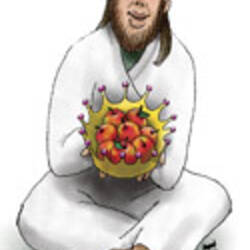Loading...
Click here if you don’t see subscription options
Click here if you don’t see subscription options
Faith in Focus
Finding renewal--and a dose of irreverence--in a women's prayer group
Signs Of the Times
Millions of stockpiled cluster submunitions have been destroyed years ahead of deadlines mandated by an August 2010 treaty.
Signs Of the Times
A tsunami followed by a volcano eruption in Indonesia claimed more than 400 lives and displaced thousands.
Film
A “feel-good film” is the oddest of descriptions of a movie about human dismemberment. Yet in the case of "127 Hours," the cliché is apt.
Examining the Phoenix case in light of church tradition
Editorials
Israelis must ask, has the idea of an ethnic state become an anachronism?
Letters
Disgruntled vs. Gruntled According to your editorial “Voting Bloc” (10/25), the disgruntled folk are the more energized portion of the electorate. For sure they are the most energetic bloggers. But allow me as a reasonably “gruntled” citizen to put in a word. The Obama admini
Signs Of the Times
Religiously mixed marriages have shown a significant decline among American Catholics in the past 20 years.
Signs Of the Times
Thomas P. Gaunt, S.J., was named executive director of the Center for Applied Research in the Apostolate at Georgetown University.
In All Things
nbsp Thomas J Reese S J senior fellow at the Woodstock Theological Center at Georgetown University and nbsp former editor in chief of America and author of Inside the Vatican nbsp sent us along this helpful primer--designed nbsp for the media but informative for everyone--for the upcoming co
The Good Word
All three of this Sunday rsquo s readings put us in mind of the end the eschaton in Greek nbsp So much of the speculation about the eschaton in the modern world comes from those who would like to tell us exactly when and how it will come nbsp Yet the post-exilic prophets the Gospels and the l
In All Things
Karen Smith our indefatigable editorial director is also a painter nbsp who has written several sensitive art reviews for our Culture section including this week s review of Fernando Botero s searing Abu Ghraib series nbsp In our online Culture section this week she turns her attention to a
The Good Word
Next Sunday is the Feast of Christ the King which brings us to the end of this liturgical year nbsp It is fitting then that the Gospel which precedes the nbsp Feast of Christ the King speak of future things nbsp Our Sunday Gospel cites only a portion of Jesus predictions about the future a
In All Things
Update Over 100 Catholic Clergy Attend Exorcism Training in Baltimore The portion of the In All Things commentariat that thinks I m in need of an exorcism may soon have their wish This weekend Catholic bishops from around the United States gather in Baltimore for the United States Conference o
In All Things
From Mirada Global and Mensaje magazine a look at the popularity and unique influence of Brazil s president A politician knows he has succeeded when his adversaries come close to him to share his popularity This is what has happened to Brazilian president Luiz In aacute cio Lula da Silva Jos ea
In All Things
Robert Mickens sent us this tip about a new report that he says has produced extensive evidence that last-minute changes were made to the English translation of the Roman Missal without the knowledge or approval of the competent bishops rsquo conferences and in violation of the Vatican rsquo s own
In All Things
The UN General Assembly voted yesterday for a moratorium on the death penalty advocated by almost all European and Western nations but voted against by the world s greatest violators of human rights China Iran Sudan Saudi Arabia The only major western nation to be included in this roll of dis










